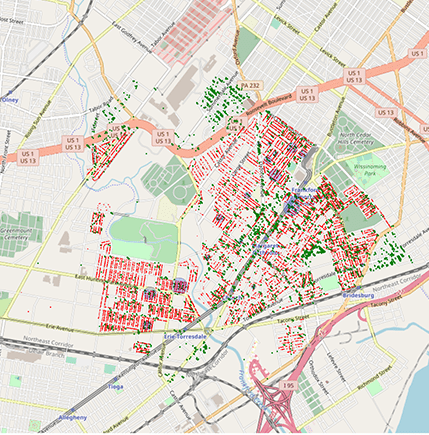Computer Science major Amy Gottsegen knows more than your average College of Computing & Informatics (CCI) student about Philadelphia’s gentrification problem. She’s tracking the city’s shifting demographics for the Philadelphia Tenants Union (PTU) using a predictive algorithm that she is building herself.
As a junior on co-op as a research programmer (thanks to a grant from the Steinbright Partners Program), Gottsegen also worked part-time for the CREATE Lab at Carnegie Mellon University to apply the knowledge gained from her project in Philadelphia to housing data in Pittsburgh. Her idea for the algorithm was born after talking with her research advisor Jake Williams, PhD, an assistant professor of information science at CCI, about combining knowledge from computational and social sciences to work on a project for the public good.
“I had been doing canvassing with the PTU for a while and really liked the way they work,” Gottsegen said. “We thought we could help them by using predictive algorithms to find where they should canvas in the city — where they’re most likely to find people who are dealing with landlord issues or facing displacement.”
In gentrifying areas, developers buy the up cheaper property units where a lot of low-income tenants live and “start to make renting there really horrible,” Gottsegen explained.
"We thought we could help them by using predictive algorithms to find where they should canvas in the city — where they’re most likely to find people who are dealing with landlord issues or facing displacement."
Amy Gottsegen
The PTU is a volunteer, tenant-led organization dedicated to winning safe, decent and affordable housing for every renter in the Philadelphia area. Its most recent undertaking was helping those displaced by the renovation of the Penn Wynne Homes, a luxury condominium complex in Wynnewood.
“That was a case where, I think, 200 families were evicted,” Gottsegen said. “And the [PTU] only found out about what was going on there when everyone had a month left to get out.”At this point, she said, many of the people still left in the building were facing homelessness upon eviction. The PTU was able to mitigate the situation, so these tenants could stay a little bit longer while they found them new places to live, but it could have provided even more support to the tenants if it had found out about these evictions earlier in the process.
Because PTU advocates are volunteers and can’t devote a lot of time to canvassing, figuring out the densest area where residents have the most potential for exposure to evictions is critical. That’s where Gottsegen and Williams’ work can help.
Gottsegen’s algorithm uses geospatial data to determine which communities in Philadelphia are most likely to experience eviction issues. The most useful dataset they have is one that a public interest lawyer in the city compiled of landlord-tenant court cases, scraping together all of the legal dockets since the 1960s for evictions. That dataset doesn’t seem to provide a complete picture of the city’s evictions, however, when you consider research conducted by ethnographer and Princeton University Professor Matthew Desmond; he found that evictions that are represented in court records only account for approximately one third of total forced moves, as many people receive informal evictions by their landlords.
 Map of evictions in Philadelphia 2017.
Map of evictions in Philadelphia 2017.
They are also collecting data from Craigslist by pulling from their RSS feed; the challenge is figuring out what data is public domain. She and Williams have investigated whether they can determine the potential of displacement within communities according to the rental market through listings on Trulia, Zillow or Airbnb rental prices, but all of that data is held according to the companies’ interests.
“It’s not necessarily something that we can work with publicly,” Williams explained. “We can’t go against their policies for fear of exposing the Tenants Union or ourselves to any sort of legal action.”
Since PTU’s inception in 2016, the organization has pursued a “Good Cause” campaign which supports policies to prevent evictions at the end of a lease without the tenants having broken the terms of the lease or fallen behind on rent (as they should already be protected during the lease).
A bill supporting this policy change was introduced on October 5 and is being deliberated Philadelphia City Council. To help the PTU be more effective in their canvassing efforts, Gottsegen created maps in the council districts that are going to be pivotal for a vote, based on where evictions are happening and where registered voters live.
If all goes to plan, Gottsegen's maps will indicate regions with the highest percentage of housing displacement to find voters who could potentially be interested in this bill.